D.C. United had gotten off to a rather dreadful start in its inaugural 1996 Major League Soccer season.
The team had stumbled to an abysmal 1-6 record, scoring but seven goals.
At RFK Stadium, a frustrated and disappointed fan base already were holding signs that said “Arena go back to Virginia”.
There were even rumors of Bruce Arena's job security swirling around the United office.
That's when club president Kevin Payne stepped in.
"There was a lot of buzzing around the D.C. United office about me," Arena said. "Kevin one day got everyone together and he said, 'If I hear anyone talking about getting rid of this coach, you're fired. The support he gave me was incredible. And obviously, we went on to win championships and everything else.
"I'll remember this obviously for the rest of my life."
Payne believed in Arena as the two men masterminded MLS' first dynasty.
Who knows what the course of U.S. soccer history would have been had Payne jettisoned his coach? Would have there been D.C. United's early success as MLS's premier franchise on and off the field? Would have Arena coached the U.S. Men's National Team to the quarterfinals of the 2002 FIFA World Cup?
And that gesture - Payne's loyalty to his head coach - helped define his impact on U.S. Soccer and U.S. soccer for more than three decades.
Payne had vision, bold ideas and plans.
He held steadfast to his beliefs and principles.
He looked for ways to improve the beautiful game in the USA.
He was passionate about the game and just about everything in life, for that matter.
His soccer family tree has many branches, from the front office to players to coaches.
And he had opinions, opinions on just about everything.
Kevin Joseph Payne passed away in Charleston, S.C. on Dec. 25, 2022 from lung disease. He was 69. He is survived by his wife Pam daughters Ashley and Rebecca grandchildren, Lucas, Ian Paul and Theo.
"It's a huge loss," former U.S. Soccer President Sunil Gulati said. "On the professional side there are very few people in involved in the sport that had broader knowledge of how the puzzle pieces fit. And by that, I mean youth soccer on top of the international game, the national team, the pro game, coaching, all of those things and the politics of all of those things. Kevin worked in almost all of those areas and had an expertise in virtually all of those areas. There weren't many people like that in the country.
"On the personal side, he was a very dear friend for 33 years, who was a confidant."
During more than three decades, Payne was one of the most influential figures in American soccer history.
Then again, Payne always walked to the beat of a different drum. He made decisions – big and small – that impacted several levels of U.S. Soccer and soccer in this country for more than three decades. He worked for U.S. Soccer, oversaw the rise of D.C. United as a model franchise on and off the field, presided over six MLS teams at the same time that helped save the league, and most recently influenced youth soccer as the CEO and Executive Director of US Club Soccer.
Payne's passion extended from his own family to his soccer family at D.C. United, MLS and U.S. Soccer.
"If you really think about it, Kevin was responsible for three National Team coaches, myself, Bob Bradley and Dave Sarachan," said Arena, who directed D.C. United to the first two MLS Cup titles and the LA Galaxy to three others. "It shows you the influence Kevin had on a sport in our country. It wasn't just about selling tickets and getting more creative deals. He had an influence on the technical side. At the league level and the Board of Governors, Kevin was very influential and always pushing things for the good of the game, which was very rare. When you had a league in its infancy, there were really not a whole lot of people knew much about the sport. Kevin was a real spokesperson for the sport along with Sunil and helped obviously build a league in those early days where we didn't know what the hell we were doing, and we were in dire straits financially.
"It was a real battle to get through in the early years and then he was obviously influential in me getting the national team job and our success at the 2002 World Cup. It probably saved the league at the time because there was talk about it folding. So Kevin, behind the scenes, was very influential for the sport in our country and particularly MLS. ... I don't think I've ever met anyone who was as passionate about the sport as Kevin."
Many individuals interviewed mentioned Payne's love of the game.
Here is a collection of comments about Payne from his associates, colleagues, coaches and former D.C. players who knew him best:
* Former U.S. Soccer treasurer Richard Groff: "I would have to be very honest: U.S. Soccer would not be where it is today if Kevin Payne hadn't come on the team in 1988, period. He was a giant. What made him unique was he was so passionate about the sport. He was smart. He was creative. He just wanted to work hard to grow the sport at every level, and I knew him probably at four different levels in the sport, and each time he made a difference. He was brilliant at commercial growth, business, sponsorship and development. He certainly was brilliant when it came to developing a professional team and yet he was so supportive -- his relationship with Bruce was well known."
* Thomas Rongen, who coached D.C. to the 1999 MLS Cup championship: "I coached or worked for a lot of presidents in different capacities in soccer been with the four MLS teams and with the U.S. U-20 Under Men’s National Team. Kevin was by far the best with the ability to shape something. Kevin was the only one out of that whole group and list of people that actually could talk about the game, because a lot of times presidents or owners would like to insert their two cents worth. Kevin had an incredible keen sense even though he never played at the highest level."
* Former United assistant coach Dave Sarachan: "He really was a unique guy because he never graduated college, yet he's one of the brightest guys I've ever been around."
* Former United and USMNT defender Jeff Agoos, MLS senior vice president, competition and medical administration: "I think that the first words that come to mind are just passionate. He was incredibly passionate about things he believed in. He really believed in in the sport, believed in the club and the people that were there. He was very much a family person, and loved and was incredibly passionate about Pam and his two daughters.
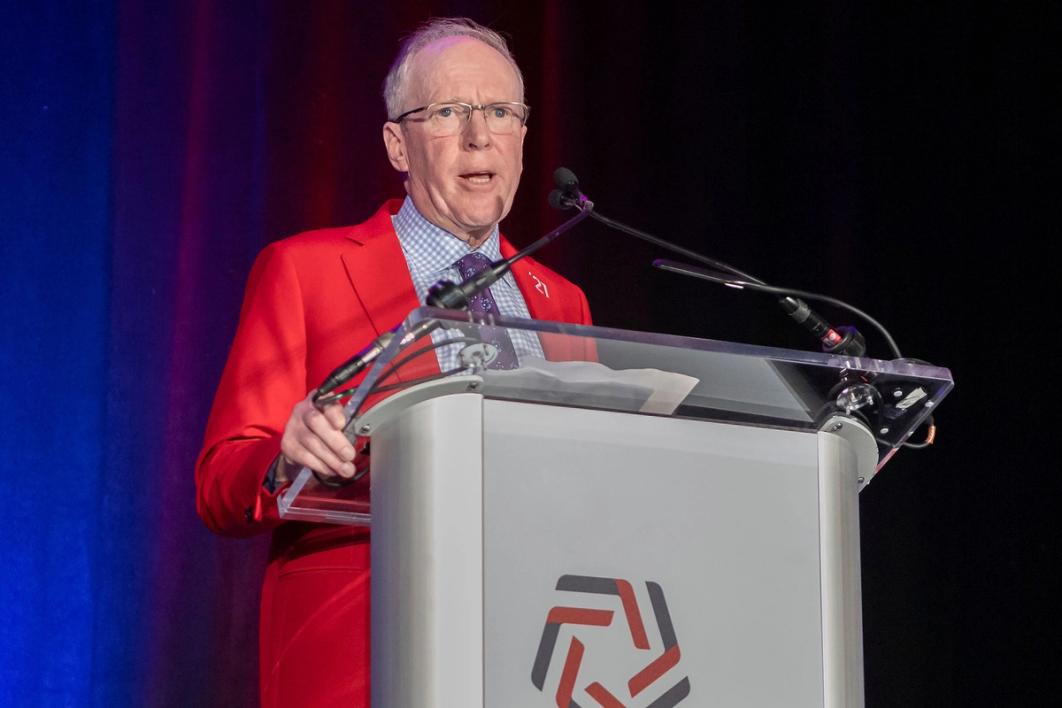
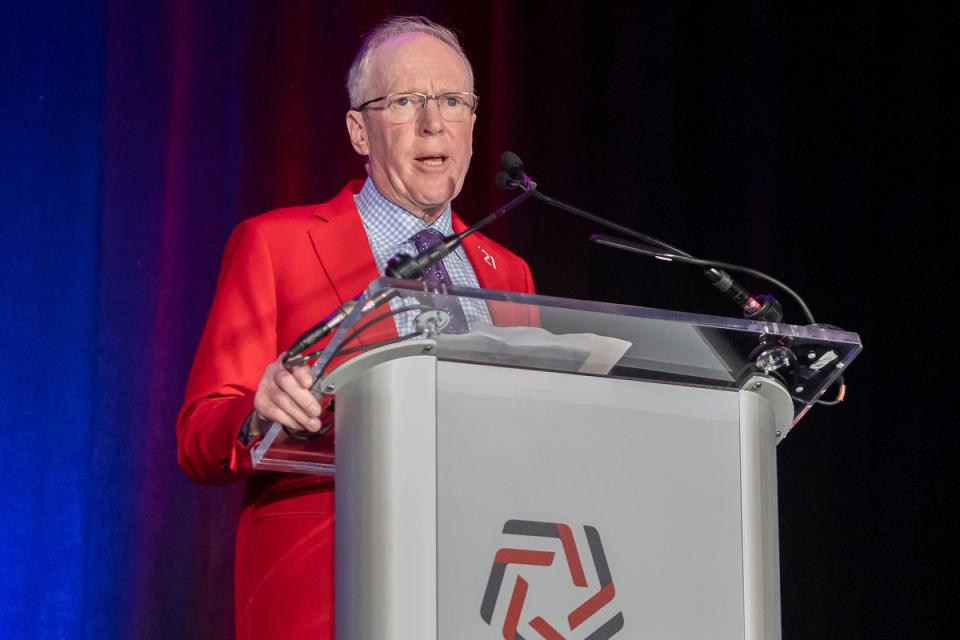
"Kevin was just an incredible person. When he had an idea or a feeling about what was good for not only the club but for the game, he held on to it. He was like a dog on a bone. He was able to influence and persuade people. He was incredibly intelligent about his approach. He really epitomized what we wanted or what was needed in the game. He had great instincts for the game."
* Former United TV play-by-play voice Dave Johnson: "If you had the confidence and support of Kevin Payne, which I was fortunate to have, it made you feel like you could do anything. That's the mark of a true leader. A leader brings out the best in people."
* Former D.C. and USMNT captain and midfielder John Harkes: "Kevin had the vision and the mission statement to back it up on what he wanted to do in the community. He wanted our club to not just be a winning club, one that starts with tradition, but he wanted it to be a family. That's how he went about everything. He was a charismatic guy. He was always genuine when he was speaking to you. He had a lot of opinions, a great deal of opinions, certainly, and we all chuckle and laugh about those but he cared. He was an executive that loved the game. When you're emotionally invested in the game, whether you're an owner or soccer exec, a president, whatever role you may play in the club, that goes a long way because there's such a great connection and understanding of how to do things."
* Former USMNT and D.C. defender Eddie Pope: "At the time, teams are trying to figure out how to be set up. Kevin, he was way ahead of the game and was bringing in Bruce and training facilities. We were just so far ahead because of the way Kevin had everything just so organized and put together. To say that it was paramount to our success would be an understatement. And for me that just goes to show how well he did his job."
* Former MLS director of referees Joe Machnik: "Just look at the positions he has held. He was a good manager. He put together the first D.C. United teams and they won three of the first four championships of MLS. They became the symbol of what a good franchise is supposed to be."
* Ray Trifari, United's director of team administration for 13 years: "Kevin was a special person and he was such a guiding light for so many of us through those years."
Born on March 5, 1953, Payne grew up playing soccer and attending Lakeland High School in Shrub Oak, N.Y. (Westchester County) and continued to play the beautiful game at LeMoyne College in Syracuse, N.Y. and at the semi-pro level. He didn't finish college, but that did not stop a determined young man.
"What I think was impressive was he wasn't a former [pro] soccer player, Agoos said. "But he caught on very quickly about what the game was about and what had to be done on the business end. That's not an easy thing to do."
After embarking on his career as radio journalist at WFAS, Payne got a job as a special events executive in Vail, Colo., entering the soccer business side in 1989. That was near the U.S. Soccer Federation offices in Colorado Springs, and he eventually was hired as the National Administrator of U.S. Soccer by then President Werner Fricker. When Alan Rothenberg became president in 1990, he asked Payne to remain as Deputy Executive Director and Director of Marketing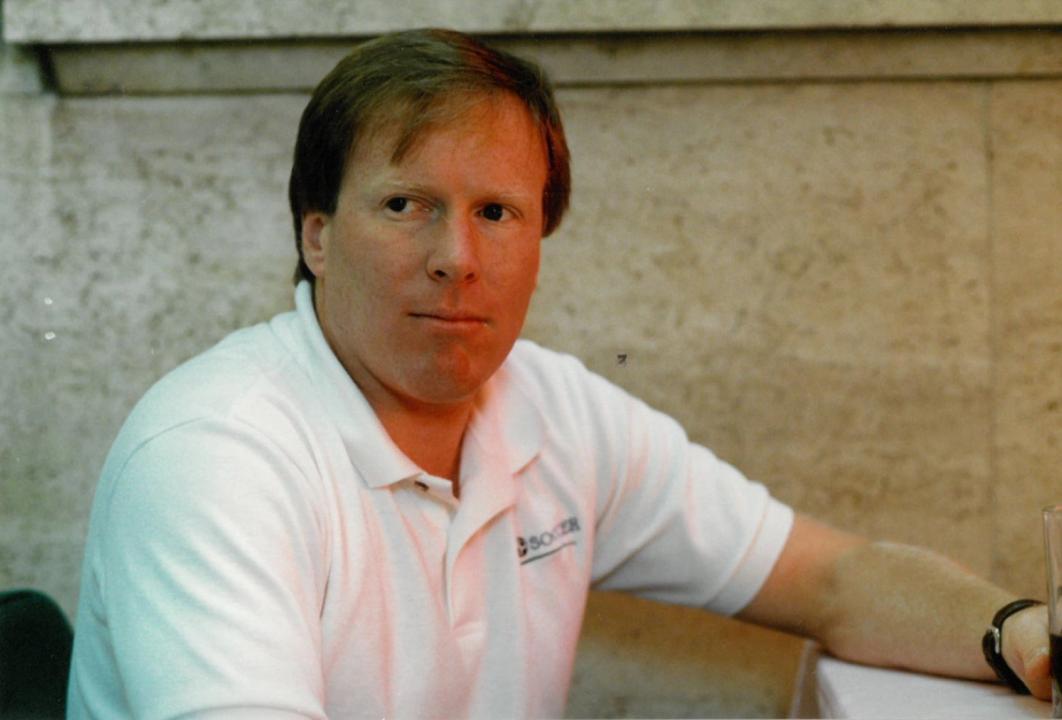
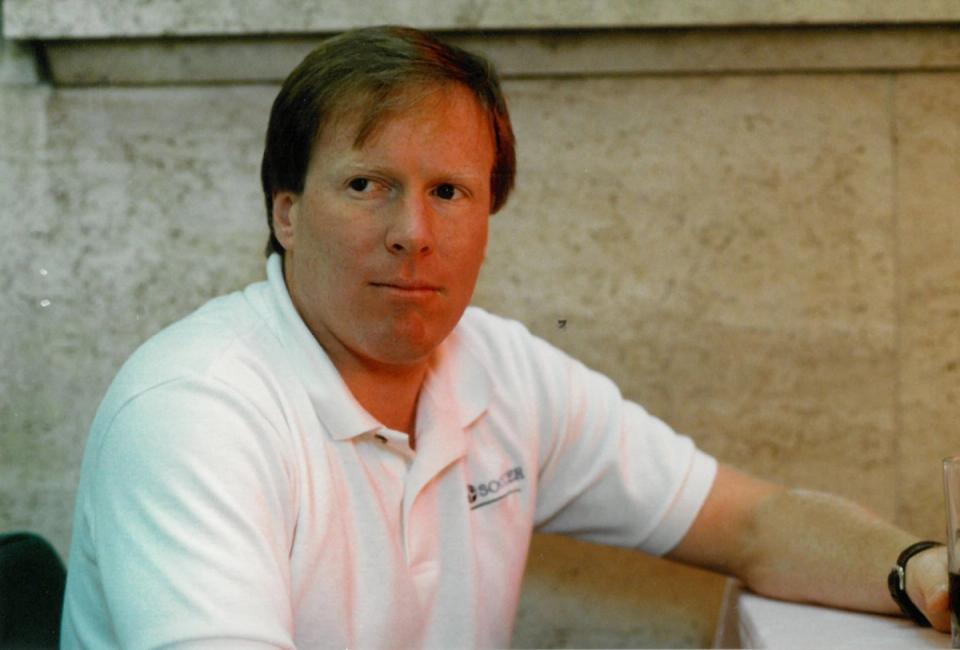
"When Alan Rothenberg appointed me as Secretary General, Kevin was pretty much running things," former U.S. Soccer Secretary General Hank Steinbrecher said. "Keith Walker was there but he wasn't doing really very much. Kevin was the man that was running the staff. So initially, it was a little bit uncomfortable. I took the job he had. I was very, very impressed with Kevin and we both couldn't do the same job. But he was very, very articulate. He was clearly very passionate about the game. I thought he would be a very strong suit to market to the sport. I asked him to stay aboard as the head of marketing. He left the Federation under great terms."
Payne became president of Soccer USA Partners, a marketing firm that owned marketing, broadcast and event promotion rights to the U.S. National Team prior to the 1994 FIFA World Cup. He was in charge of bringing players' families to Europe for the 1990 FIFA World Cup in Italy.
"He didn't come from the game, but he learned a lot about the game, and he understood where that line was and where he needed to tread," Agoos said. "He was great at connecting people. He was an incredible giver. When he believed in something, he would donate time or money. If he believed in the cause, he believed in it 100 percent and went full, full bore. He was an incredibly loyal person. If you worked for him, or you are part of his circle, he would do anything for you. Those are the type of people that don't come around very often."
"What Kevin really understood at its core was the difference between the saying what's good for business is sometimes good for the game. But what's good for the game is always good for business. So he prioritized the game, he prioritized the sport, the players, the coaches and understood that somewhere down the line, the benefit would occur on the business end. You don't always see that in sports. A lot of times you see the commercial side driving a lot of the other decisions that are being made on and off the field."
Among Payne's qualities that impressed Rongen was his knowledge of the game, past and present.
"Kevin talked about history of the game … he could talk about players in a World Cup game in group play of 20 years ago, 30 years ago, and then be able to apply it to the modern game and give me some suggestions," he said.
When MLS was formed, Payne took on another challenge. He pieced together the investment group for United, one of the 10 original franchises of the fledgling league in 1996.
As president and general manager, Payne's most important hire was Arena, who had at the time had created a dynasty at the University of Virginia as the Cavaliers achieved a three-peat of NCAA Division I titles (1991, 1992 and 1993) and winning five overall.
"He really had the foresight to hire Bruce," Sarachan said. "Bruce at the time was pretty well entrenched at UVA, but he had the foresight in people, what they could be and how they could be successful."
"They were the league back then," Steinbrecher said of the early D.C. United teams. "Thankfully, one of his greatest attributes in my opinion was he was a man of courage. He was not afraid to take a risk. He was not afraid to do things that were completely out of the ordinary or out of the norm. Look at hiring Bruce Arena for the pros. Courage, you're hiring an American coach in an environment where the where the competition is going to be really, really, really heated."
Payne and Arena realized they needed to bring in certain foreign players who could not only make an impact on the field but stir interest off of it. Bolivian internationals Marco Etcheverry and Jaime Moreno and Salvadoran striker Raul Arce Diaz were the most important offensive threats that helped define D.C. United's attacking philosophy.
"He played a critical role in the startup of the league in trying to keep their traditional elements of the league and then built an extraordinary team in the organization in Washington," said Gulati, who noted that seven members of that original United side were in the National Soccer Hall of Fame.
That included Harkes, Pope, Agoos, Etcheverry, Moreno, Arena and Payne, who was inducted in 2021.
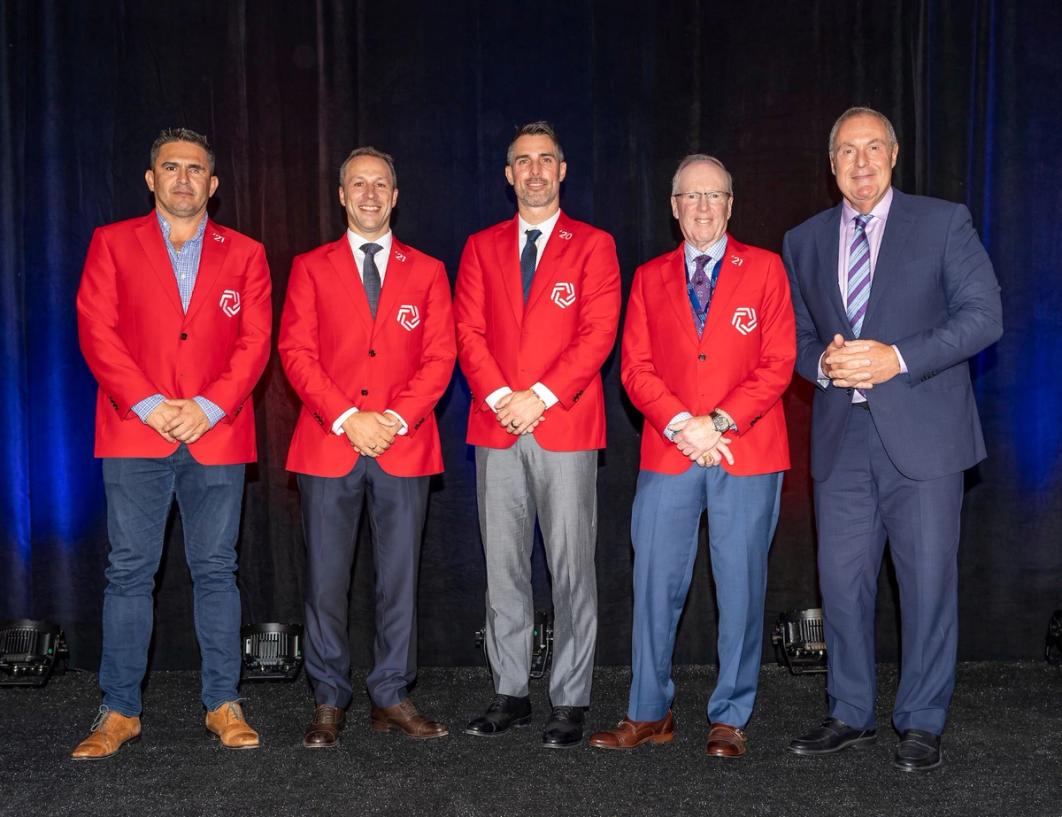
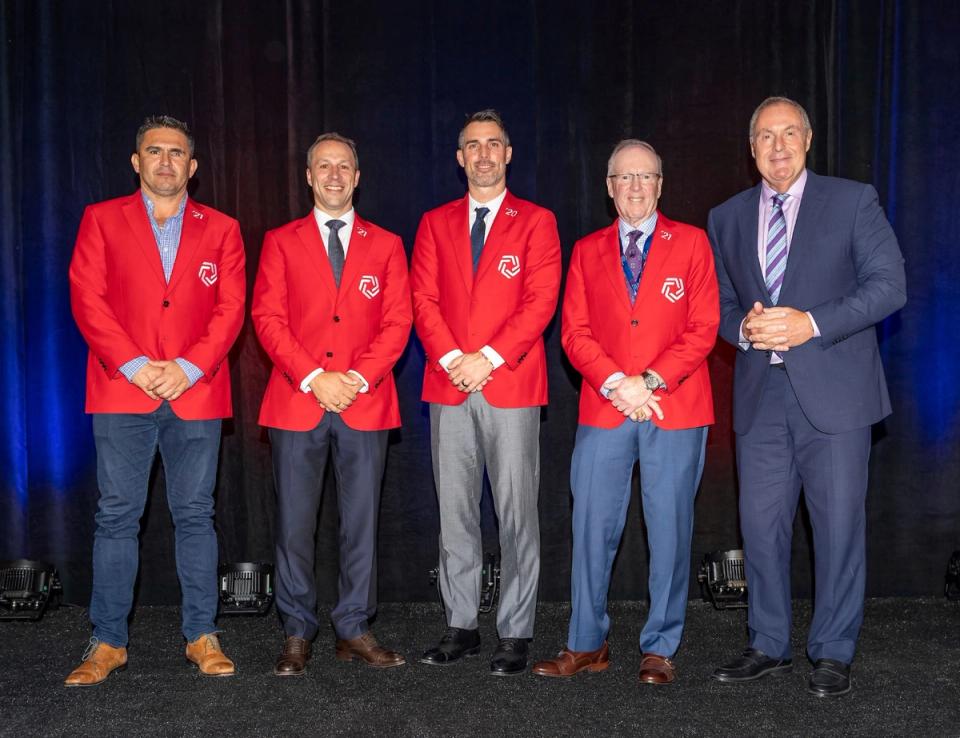
"To have one club with a Hall of Fame president, a Hall of Fame coach and five Hall of Fame players at the start of the league is mind boggling. That set the path for so many different clubs - everything from the names they use, to the way they tried to play, and looking south for players as well."
United dominated the league early on, reaching the first four MLS Cup finals and winning three (1996, 1997, 1999) and a fourth in 2004.
"Kevin understood the importance of having a gold standard, having a team that everyone can shoot for, they would love to hate because when we went on the road we brought in the biggest crowds," Trifari said. "We were the cash register."
The team also won the 1996 Lamar Hunt U.S. Open Cup and Interamerican Cup in 1998 although the latter title, a win over Vasco da Gama, was not well publicized or appreciated by the American soccer community at the time. After dropping the first leg, 1-0, D.C. rallied for a 2-0 triumph in the final leg to win the aggregate goals series, 2-1.
"Kevin really felt that the Interamerican Cup victory takes a rightful place alongside the MLS Cups, and there's a lot of ways it's superior to them." Trifari said, adding that Payne "felt that that was a highly important accomplishment for Major League Soccer and got nowhere near the attention it deserved. It was very much under the radar."
Payne was savvy in another way - getting publicity at the national level as he named Ray Hudson head coach for the 2002 season after the Miami Fusion folded following the previous campaign.
"One of the big reasons why he hired Ray Hudson was because he knew his personality was going to get him on ESPN," Trifari said. “He was going to be on those panel shows, and it would say Ray Hudson, D.C. United underneath it. He knew that that was going to help D.C. United. He found it to be an attractive hire for marketing purposes and for publicity. I think it worked out.”
Payne essentially had two goals - creating an attractive, winning team on the field and an absorbing fan culture off it.
Starting from scratch, it wasn't easy, but the United president found a way to make RFK Stadium the best fan experience possible in the league.
Having a strong and vocal fan base at the home venue was high on his list of priorities, although many outside the new soccer world of MLS did not truly understand it, at least not yet.
That included taking care of supporter clubs.
"He talked passionately about being an authentic team that represents real soccer people in Washington D.C. That it hit upon me how important it was to do that," said Chicago House AC president Peter Wilt, who visited United in 1997 while he was working to build the expansion Chicago Fire. Wilt long has been an advocate of a strong fan culture.
"It sounds like common sense, but at the time I think MLS was more concerned about selling tickets almost in a used car salesman way," he said. "They did so certainly through youth soccer, a lot of group outings. But Kevin built a team that fans wanted to be part of, and he let them be part of it."
That fan base began through the likes of supporters’ groups. The best-known ones were La Barra Brava, who have had a fusion of Hispanic support and more than 20 nationalities, Screaming Eagles, which has been around since 1995, a year before D.C. kicked a ball, and La Norte, which was situated behind the north goal.
"Kevin went out and got those players - Raul Diaz Arce, Jaime Moreno and Marco Etcheverry and he gave those fans, all the supporters, the freedom to be themselves and the freedom to support the team in the way they wanted and they way they were accustomed to overseas," Wilt said. "That was in big contrast to what I had experienced with other MLS teams that saw supporter groups as a nuisance."
Wilt remembered when he shadowed an MLS general manager when he was learning the do’s and dont’s of the fledgling league.
"I heard security on his walkie talkie telling them about a problem in the supporter section," he said. "He radioed back and said, 'Well, kick them out.' The general manager told me, 'Well we have some supporters that are throwing confetti.' He kicked them out because they were throwing confetti? Well, that seems a bit a bit much. I told him: 'Don't you want them celebrating?' He said, 'Well, we pay our clean-up cost here at the stadium, so we don't allow confetti.'
"Kevin Payne understood the soccer fans, in large part because he was one. Kevin was a soccer fan. And sometimes that's lost when you look at his career, because we see Kevin as the executive and businessman. He was very good at both of those things. He dragged American soccer into the 21st century. But I think what fueled his abilities as an executive was his passion as a soccer fan."
Payne made it easier for groups such as La Barra Barva to store its equipment at the stadium, "like the big drum, so those people didn't have to carry it home every day. They just picked it up in the stadium," Machnik said.
Supporters clubs were a relatively new phenomenon back in the day.
"The security there had never seen an atmosphere like that," Johnson said. "The Washington football team could create an atmosphere but there was never a situation where the stands were rocking that much, and the drums were banging and flags waving and people standing and he got right in the middle of it."
Payne helped broker an understanding with the RFK security guards.
"Understandably if you're a security guard, you don't know anything about the passion of football or soccer, you might think all you've heard is that there were riots and that type of thing," Johnson said. "He made sure that the security guards understood the culture the passion of the game and that helped make RFK Stadium the place to go to in the early days. Whenever there was a network game, ABC or ESPN loved to come to RFK Stadium because you are guaranteed an authentic atmosphere."
While most fans saw RFK Stadium and currently Audi Field as the team's home, the players' true home was its training facility, where they could be up to five or six times a week.
Payne realized that early and had the team take over the old Washington Redskins (now Commanders) facility near Dulles airport in Herndon, Va. D.C. United Soccer Park, which put the team well ahead of the curve of many of its MLS rivals, had fields and offices that the club could call home.
"That played a major role in the success of the team," Pope said. "I just can't say that enough. It was the best in the league at the time. It was what you would find in a lot of other countries at that time.
"As a young professional you had absolutely everything that you needed at your fingertips and all you had to do is worry about performance on the field. There wasn't this training at a high school field, not knowing where you're going to train the day before a game, all the craziness that can really throw a team or an individual player off. It was just such a fantastic setup."
As Chief Sporting Officer of Carolina Core FC, which will make its MLS Next Pro debut in 2024, Pope has taken many of Payne's ideas while mapping out his team's direction.
"Even to this day, that's been a lesson to me as I embark on what I'm doing and just how you should be prepared," he said. "Especially if you have time to prepare to make sure that your players come in and don't think they have to focus on anything but their on-field performance."
Culture also meant the team logo and uniform, which has been fairly constant through the years from 1996 to today.
The uniform was black and red, with an eagle as its symbol.
"The uniform was a direct reflection of what D.C. was," Agoos said. "We had some crazy uniforms at other clubs like the San Jose Clash and the Kansas City Wizards, for example. But Kevin was steadfast that D.C. was going to be more traditional with a name like United. The jersey, the way it looked, didn't change and it was always very much the same. He understood that type of consistency and what tradition actually meant. You knew that from the very beginning. We were a soccer club, a football club, and that was what was driving us, not being a commercial entity."
Players and management can have a contentious relationship for obvious reasons, whether it is contract negotiations, training or playing conditions.
When he wasn't out of town at a league meeting or a U.S. Soccer board meeting, Payne made it a habit to be around training as much as he could. He also talked to the players as much as he could, which meant a lot.
"He was just an incredible leader so much so that his nickname was not only KP, but - at least from a player's [perspective] - El Presidente, because it signified him as being the top and the leader and somebody that people would follow.
"Initially, we didn't know Kevin well. There's always this fear that, especially the president or the people on the commercial side, just don't understand what it's like to be a player, what the sporting side needs. Very quickly we learned that that was not the case with Kevin. There was a trust in there and that we could discuss very sensitive things with Kevin that related back to the game and that he would always analyze these and provide appreciation of what players and coaches and people on the sporting side were going through."
Harkes remembered how accessible Payne was.
"He was very endearing. Engaging with the personnel was key," he said. "There wasn't anybody on the roster that Kevin didn't speak to or didn't know. I mean, he knew everybody."
That went a long way for Pope.
"He was one of those GMs that was friends to all the players and that's not easy to do," he said, "especially when you have to move players along and bring players in and things like that.
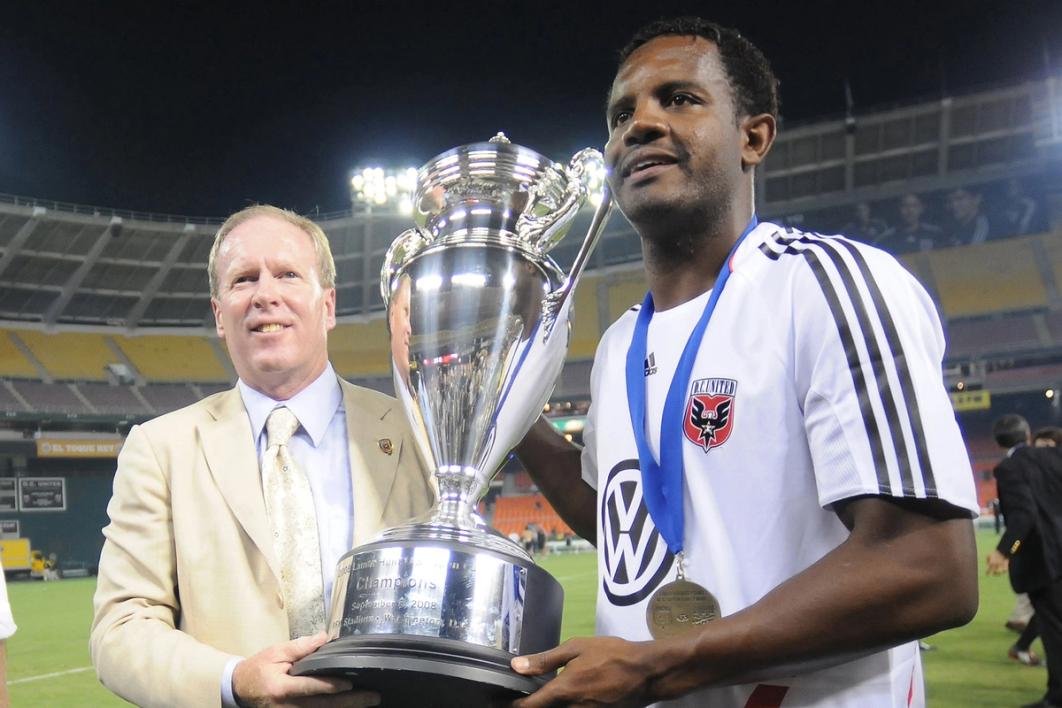
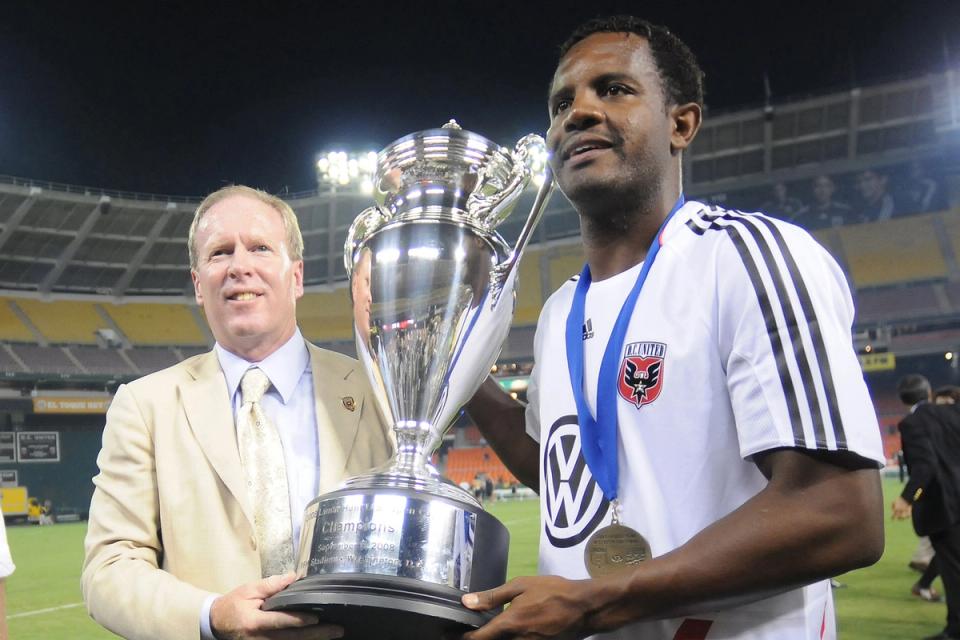
"The person you're negotiating with ... it's just about knowing that person and trusting that person is fair, then you can have that type of relationship. Pick your league. A lot of players would say that the person in opposition can't always be trusted. I would not say that for Kevin. I think everyone trusted him. Again, he was great and fun to be around. He was just so charismatic that he was able to pull that off.
"It's not a surprise that a lot of the players that played with Kevin have remained his friend even after being moved on over the years. We remained in touch and had conversations at times and always took time out to say hello. That just speaks volumes of who he was as a person."
Ben Olsen served under Payne as a player and coach, so they had a unique relationship.
"There was a strange paternal feeling towards the relationship that you had with Kevin," he said. "His loyalty was second to none. In fact, he and Bruce both had this loyalty about them. Sometimes it was tough love."
Early in his career, Olsen endured several injuries, but Payne refused to trade the young midfielder.
"He stuck with me," he said. I was two full years into my career. I was injured. I ended up having 10 surgeries. I was damaged goods. I know for a fact Tommy [Rongen] wanted to kind of move me on, and Kevin probably convinced him on the side that you know 90 percent of me is still worth having around."
To top everything off, Payne would hit the field at United Park.
"Sometimes Kevin would come out to training, which we enjoyed also, and every now and then he put on the boots and knocked the ball around with Bruce," Pope said. “It's like he was he was always up for it."
When Pope was commuting between United and the University of North Carolina during his 1996 rookie campaign while finishing up his college degree, Payne and the club spared no expense paying for his flight needs.
"I think their willingness to allow me to do that was obviously tremendous," he said. "It just they gave me what I needed as a young player to be able to be successful. That was something that I needed at the time. I needed to continue my education and to get my degree and they just made it super easy for me. He saw the bigger picture and was more concerned about my well-being as an individual and a player than anything else."
Pope, incidentally, scored the winning goal in extra time to give United a 3-2 comeback win in the inaugural MLS Cup.
In Rongen's first season as head coach in 1999, United won its third MLS Cup in four years.
"We celebrated. I cried with Ben Olsen on the field," he said. "I hugged Kevin. I spent about 15 minutes with my wife outside of the stadium, just the two of us. Literally when I walked away, here's Kevin, who said: "Listen, we've got to go to work. Meet me at nine o'clock tomorrow in the office. We're half a million over the salary cap."
At that time half a million dollars was pretty much half of the salary cap, Rongen said.
"Due to the success of D.C. United you get punished basically," he added. "We didn't go on vacation."
United was forced to trade Agoos, Richie Williams and Roy Lassiter to get under the cap for the 2000 season. The team failed to reach the playoffs for three consecutive years before capturing its fourth MLS Cup in 2004 as Payne rebuilt the team with several key player acquisitions and trades.
Payne put in the work. "Twelve- 14-, 16-hour days, whatever it took," Rongen said. "We stayed in the office late and that's when we made most of our deals. We thought outside of the box. Kevin taught me to become a better listener because I was pretty dominant and strong within the players group so I became a little bit more democratic.
"He was always the reason why D.C. United was so successful because he was always one step ahead of people. He was seeking information through journalists, through people in other organizations in order to facilitate a trade or to find out something about a particular player that we can use to our advantage in negotiations."
D.C. United hardly was a one-man show.
"He always surrounded himself with great people," Rongen said. "He was not only brilliant in terms of building a team and recognizing what people he needed to lead, Bruce Arena being probably the greatest example.
"Kevin walked that fine line of being brilliant and almost crazy at times, but at the end of the day he got the job done."
When he was 16-years-old in 2000, Bobby Convey was drafted in the first round of the MLS SuperDraft and signed with D.C. United. But there was one slight problem.
"I'm not going to live on my own," he said. "They figured out was I was going to have to live with a family."
It was the Payne family.
"I ended up living in in the basement of Kevin's house, moved from my parents' row house in Philadelphia to a nice, basement with my own bathroom and pool table and stuff at Kevin's," Convey.
It was important for a teenager in a new environment to be grounded.
"It was a crazy leap," Convey said. "The best part was I was able to have a family environment in a regular suburban setting. I did family dinners with them. It allowed me to have a somewhat normal existence as a teen, a normal American teenager."
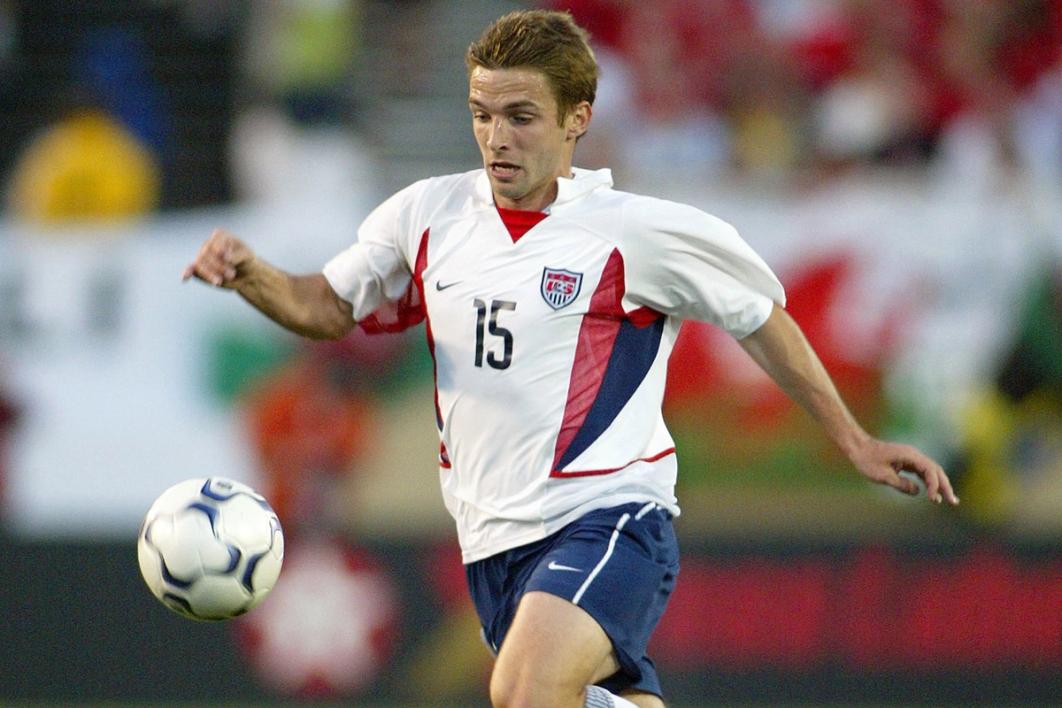
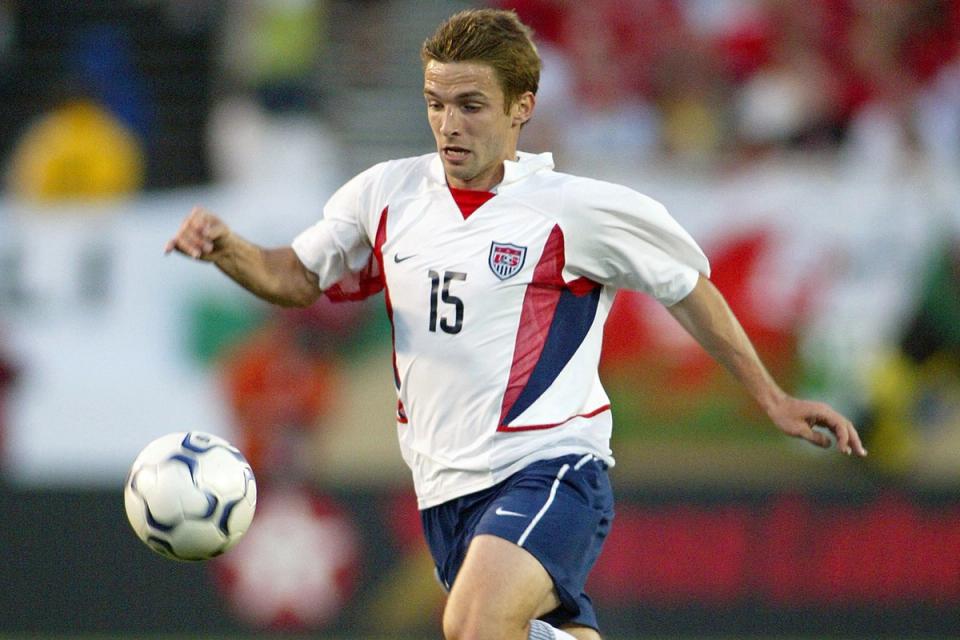
It said a lot about Payne and his family that they were willing to take Convey in.
"That's him being a responsible leader," Johnson said.
In 1998, Olsen stayed with the Arenas for a while after he signed with United.
"We just basically did it to help them make the transition from where they were coming from and into D.C. United," Arena said. "We felt that was the best way to do it in the early going. Kevin and Pam just did it because they thought it was the right thing to do. It was a great gesture."
Convey agreed.
"It was so new that it was kind of just figuring it out because this league was so new and everything was especially being so young," Convey said. "There wasn't really anything in place. There were no academies, there was nothing. You either played for the main team or you kind of played on youth clubs, so it was great to be able to do that. And with Kevin kind of thinking ahead, they were the reigning champions. It was a great spot for a young player to come in to be able to learn from a lot of guys. I roomed with Eddie Pope [on the road].
Convey lived with the Paynes for 18 months before he was able to purchase his own place a mile and a half away.
"I’ve been extremely close to their family forever," said Convey, who lives five miles from their Charleston, S.C. residence. "I see them all the time. I just talked to Pam a couple of days ago. I played golf with Kevin here. I have a unique relationship. My children played with his grandchildren because his daughter also lived here for a while."
Everyone in the U.S. soccer universe is familiar with United's team on the field.
Payne put together a pretty potent front office and he was damn proud of their performance over the years.
In 2006, United earned 10 MLS Executive Award winners. That included Senior Vice President, Stephen Zack (Executive of the Year). Dan Giffin (Top 10 Group Ticket Sales and Top 10 Ticket Sales Revenue), Mike Harloff (Ticket Sales Director of the Year), Doug Hicks (Team Public Relations Award) and Scott Miller (Account Executive of the Year, Top 10 New FSE Ticket Sales, Top 10 Group Ticket Sales Leader, Top 10 Ticket Sales Revenue Leader) all won awards in their respective categories. The D.C. United sales team also earned top honors as the 2006 Sales Team of the Year.
When Mark Washo joined D.C. United as senior director of ticket sales in 1996, he admitted he was inexperienced, but had a mentor.
"He was the leader of the organization and I certainly looked up to him as a role model, as a mentor, as somebody that just commanded respect," said Washo, who is a minority owner and vice chairman of the Flower City Union (National Independent Soccer Association). "He was just a very strong presence as a leader, and so instantly I just gravitated towards that.
"I remember him having this real strong commanding leadership presence, really setting the tone for D.C. United and MLS right out of the gate and wanted to set the standard in the league to be looked upon as like the New York Yankees and Manchester United."
After every championship, pro sports teams hand out rings to the players. United followed suit. Payne took it a step further. He made sure every club employee got one.
“In sports, you win. It's public, and your experience is shared by your teammates,” Trifari said. “Kevin expanded that concept to include everybody in D.C. United. We all got rings. We all got the same rings that the players got. Even the wives got rings. He expanded that concept of the shared experience equally to everybody who worked for D.C. United. That was a very important thing that you don't see anywhere else. Or at least I'm not familiar with it. That was all he's doing. It was central to his philosophy as the head of an organization.”
After the 2001 season, MLS was teetering on extinction with only 10 teams as it folded both Florida teams - the Miami Fusion and Tampa Bay Mutiny. There were only three primary owners - Philip Anschutz, Lamar Hunt and Robert Kraft. The Anschutz Entertainment Group wound up propping up six teams. Payne was selected as the man in charge to make sure all six clubs - LA Galaxy, Colorado Rapids, Chicago Fire, D.C. United, New York/New Jersey MetroStars and San Jose Earthquakes - ran as smooth as possible.
"I used to call him the czar of soccer because he was running six teams," Trifari said.
Johnson understood Payne's historical importance of keeping pro soccer alive in America.
"He never wavered in his time and his drive to try to make things happen," he said. "We enjoy these wonderful days now. We're tripping over expansion teams. That's not the way it was.”
Running one team is difficult enough, but six?
"Just the fact that he was in that position speaks to his credibility and his leadership and its principles," Agoos said. "He was trusted with essentially running a majority of clubs in the league. It's very similar to juggling chainsaws. There's so much danger and if one slips, the whole thing goes down."
But it didn't.
"He pulled that off magnificently," Steinbrecher said.
"He obviously did something right because the league has grown to where it's at," Sarachan said.
Added Wilt: "A lot of people like to define MLS as pre-Beckham and post Beckham and that's understandable. But you can also divide it by pre-contraction and post-contraction."
Still, old allegiances died hard. While Payne played it fair with all six teams, "he never stopped bleeding black and red," Johnson said.
"I still remember a game. We either lost or tied. It was against Chicago at North Central College," he added. "We're kind of like outside the makeshift locker room they had there, and he is just still not over the loss. I'm thinking he probably should be more neutral because just across the parking lot are the Chicago Fire guys."
When Payne was first approached about joining US Club Soccer as its CEO and executive director in 2015 after he was fired as Toronto FC president, he wasn't exactly jumping for joy.
"I believe his first reaction when he was approached about potentially working in youth soccer and with US Club Soccer was 'I'd rather stick a pencil in my eye,' " said US Club Soccer Chief Operating Officer Greg Hutton. "So much so that he held on to that. At his retirement, we talked about kind of getting him a pencil on the wall as a retirement present. We missed that opportunity, but we joked about it quite a bit."
Payne joined the organization and embraced the youth game during his seven years with the organization. He moved his family to its headquarters in Charleston, S.C.
"The immediate impact he made is simply bringing a level of gravitas to the organization," said Mike Cullina, who succeeded Payne as CEO. "I don't want to say legitimizing it because Bill Sage and his team did a great job of that on their own, but certainly elevating its importance to the landscape and what it meant to soccer in general. His [Payne's] previous success in sports certainly brought some highlights to US Club Soccer -- that somebody of that stature was interested in bringing some of his skill sets to the youth game was pretty important."
Payne's cornerstone achievement with US Club Soccer was establishing Players First, a philosophy and holistic club soccer experience for parents and players that has emphasized the development of each individual to his or her full potential and has helped parents make better choices about where their children should play.
"He immediately had an emphasis on player health and safety and really empowered us and staff to embrace that and move forward pretty quickly with some initiatives," Hutton said. "Things like increasing our background screening standard and being able to enhance what we've already done in that space. That really guided I think his tenure with US Club Soccer."
Payne gave so many front office individuals their start or just helped them in their careers.
In 1991, John Guppy was a graduate student who wanted to be a part of the 1994 World Cup. He interviewed to do a research project for Soccer USA Partners.
"Everyone needs a break in life, and Kevin gave me a career defining one in New York," Guppy wrote on his Linkedin page. "Kevin became my mentor and constantly pushed me to take on new roles and responsibilities."
And up the ladder Guppy went. He was an executive vice president with the MetroStars and eventually Chicago Fire president, due to Payne's recommendation.
"I personally gleaned so many little insights from watching and listening to Kevin," Guppy also wrote. Among those insights were "Believe in the game," "Authenticity above all else," "Harbor little patience for excuses," "Success requires clear focus," and "Loyalty matters."
"These are just a few of the many guiding thoughts I have taken straight from the Kevin Payne playbook," Guppy added.
"To me, Kevin was the OG soccer marketing guy.' "
Johnson forever will be grateful to Payne, who gave him a job to be the play-by-play announcer for United games when he was doing sideline reporting for the Washington Capitals.
"He knew that I had done U.S. Youth Cup finals and I had done college soccer and this and that," Johnson said. "So he appreciated that I paid dues. He didn't want, for lack of a better way of saying it, somebody that didn't understand the game or the sport doing his team's games."
If someone ever put together a soccer family tree that Payne had hired, touched, influenced or impacted, it just might break the internet.
"The tree on and off the field has got a lot of branches," Gulati said.
"It's tremendous," Pope said. "They're still using what they learned from those early days to help them nowadays. It is insane when you think about it. And then he came up to U.S. Club Soccer. It was like now he's influencing another young generation. It's almost overwhelming to think about."
Players who became coaches?
Jesse Marsch (Leeds United), Curt Onalfo (New England Revolution assistant), Richie Williams (New York Red Bulls, Revs assistant), Olsen (Houston Dynamo) and Harkes (Greenville Triumph, USL League One)
Players in the front office?
Pat Onstad is general manager of the Houston Dynamo. Pope is the chief sporting officer of Carolina Core FC, which will make its MLS Next Pro debut in 2024.
John Guppy, another Payne disciple, the President & Founder, Gilt Edge Soccer Marketing LLC. and Washo.
Public relations and communications directors who have moved on include Michael Kammarman (U.S. Men's National Team Director of Communications), Rick Lawes (MLS media consultant) and Doug Hicks.
That is just a very short list of the Kevin Payne soccer family tree.
Passion is one of the words most often used to describe him. Passion about soccer, about his family, and just about everything in his life.
"I don't think I've ever met anyone who's passionate about the sport as Kevin," Arena said.
"Kevin didn't do anything he wasn't passionate about it," Cullina said. "Whether it was getting an ice cream cone or talking about his time at D.C. United, he had the same veins often his neck and just in a good way. He didn't have anything that he wasn't passionate about."
Payne's daughter Rebecca explained his passion on Kevin's Facebook page after he passed away.
"I'd challenge you to find somebody who operated daily with the passion of KP. If any of his qualities made him somewhat polarizing, it was his passion. It drove him, and it was intense. In certain situations, it could rub people the wrong way. But he was direct, and he was focused, and he didn't speak without the full weight of his beliefs behind his words."
Wilt understood that Payne could rub people the wrong way.
"People who didn't know Kevin well, I think sometimes we'd see some of his outgoing qualities as negatives as a bit of arrogance," he said. "But the thing is, it's not bragging if you can do it, right? Kevin backed up his talk. And he was knowledgeable. He had the experience. He had good reason to be opinionated. He'd been through the battles he'd lived it, and he's a smart guy."
Hutton: "Everybody knows that Kevin's passionate," he said. "It doesn't take long to recognize that. I didn't fully realize the extent of it until I heard him describe his opinion of soy sauce in the level of detail."
Rebecca wrote about the things that her father loved in life.
"Of course, of his people, but also Sunkist, bagels, Bruce Springsteen, the New York Rangers, Giants and Mets. Of dogs, and horses, golf, skiing and cycling. Of traveling the globe only to find a classic cheeseburger to eat wherever he went."
While the driving force of D.C. United and a serious individual, Payne knew when to laugh and enjoy himself.
"It wasn't after a loss," Olsen said. "That was not a time to laugh with Kevin. He was so invested in the results and winning. And not just for not for him but for the community. He was fiery and he just did not accept losing. He hated to lose.
"He used to ask all the college kids: 'Do you hate losing or do you love winning?' And the correct answer to him every time was that they hate losing. It was a big mark against that college kid if they said they love winning. That was how he saw the game. That's how he lived his life. I think that was contagious."
Payne was a straight shooter, Guppy remembered.
"During the early years of MLS, when a reporter asked 'What’s the one thing MLS needs to do to take the game to the next level? His answer, “The one thing MLS needs to do to take the game to the next level is to stop looking for the one thing we need to do to take the game to the next level.'
"For sure, his direct style rubbed some people the wrong way, but that was Kevin – never one to sugarcoat his opinions."
That included the media.
"He was not afraid to pick up the phone and have a conversation with a media member that didn't reflect D.C. United in the right way and complain when we weren't covered in the same way that maybe the Capitals or the Redskins were being covered," Washo said. "I remember him being borderline antagonistic, very, very bold. I know he would rub some people the wrong way. But he was out there really fighting for relevance ... that we belonged on the same playing field as all the other professional teams at the time."
Payne talked about his family a lot. He was very proud of his daughters' accomplishments.
He was the elder of another family as well - D.C. United.
When Nicole Megaloudis died in a car accident at the age of 19 in 2004, the Payne family, along with the Arena family were there to help out Rongen, who was Nicole's stepfather.
"From a personal standpoint, the Payne family and Arena family were there not for weeks but for years to come," Rongen said. "Their daughters were close to our children. His wife, Kevin, Bruce and Phyllis - they were there for us throughout whatever was needed. He always had time and he was always willing to help with emotional stress, whatever it might have been. Those are little things that you don't forget and that's why I can call him a close friend."
It shouldn't come as a surprise that Kevin and Pam Payne hosted team barbeques and parties at their northern Virginia house or at their beach house.
"That's not normal per se, especially nowadays in professional sports, to have a very family environment where everybody helped each other," Convey said. "Kevin spearheaded that with a lot of help, from Pam behind the scenes, organizing everything with the wives and the kids setting up the barbecues. We had a really good family environment there."
Added Olsen: "It really seemed like a happy moment for him to and he was doing team events for everybody. He just loved that family atmosphere to have all the players over at his house for their lake house."
Arena and Payne became best friends.
"There were so many really great things in our relationship and even going in 10 or 15 years in all different directions, we still had that closeness. Even when we didn't see each other on a regular basis," Arena said.
Their friendship wasn't lost on the players.
"Bruce and Kevin always had a lot of good banter back and forth. On the bus, airport, airplane," Pope said. "Those are always a lot of fun to listen to them kind of bust each other's chops, going back and forth and Kevin giving just as good as he was getting from Bruce and Bruce is no slouch at that. So I think those moments were always light and fun. And I could genuinely tell that Bruce really appreciated having a friend, although they worked together, but a real friend."

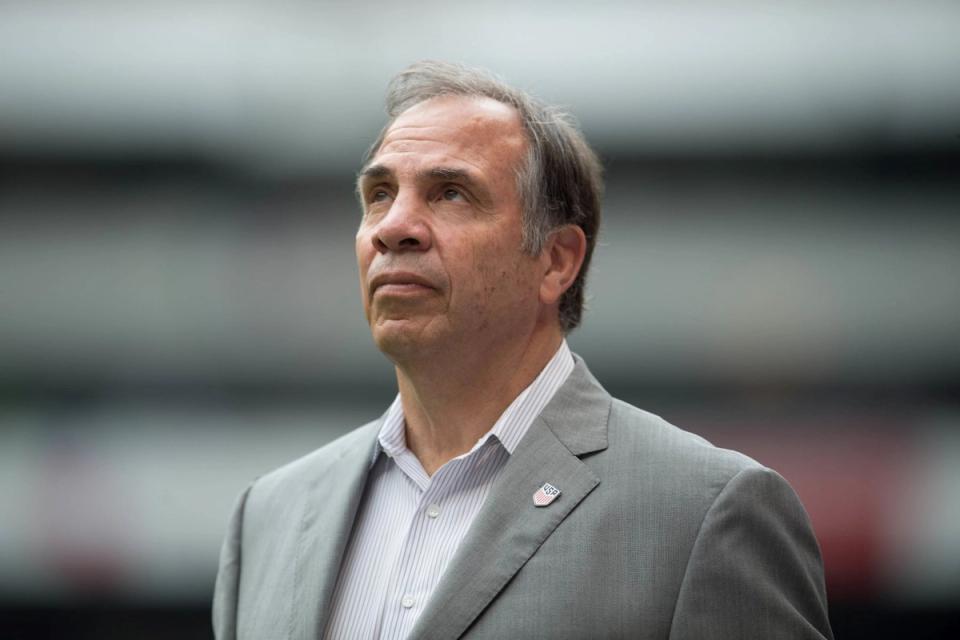
There were times when these two huge personalities clashed.
"He was the one guy that could really challenge Bruce," Sarachan said. "I mean, I did my best in my role over all the years. That's why I think we were successful. Kevin stayed strong. Bruce was a strong personality. Bruce went into his office and there were times where they got into it pretty good, and not in a bad way. It was good. It just sort of reflects Kevin's personality that it was very passionate, very devoted, really proud of the team and the culture that was created at D.C. United."
About two weeks before Payne passed away, Arena was on a Zoom call with former U.S. Secretary General Dan Flynn, Ken Chartier and Payne.
"Kevin was still at it talking about the World Cup and Argentina," Arena said. "We had a great conversation, and Kevin still held court, while not in the best physical condition. Our relationship has gone a long time. Sunil was such a great friend of his. He's going to be missed."
The D.C. United president also found time to serve a as a Board Member of the U.S. Soccer Federation from 1999-2014. holding positions as Board Member and Vice Chairman of the U.S. Soccer Foundation (1999-2021). He also served on the MLS Board of Governors and the MLS Competition Committee from its inception until September 2013 and chaired the U.S. Soccer Technical Committee from 2007-13 and was on the Technical Working Group during his time with US Club Soccer. From 2009-12, Payne served on the FIFA Global Committee for Club Football.
"Kevin was most effective away from the meeting room," Wilt said. "He was the guy that identified who were the important people on the board, whose opinion needed to be swayed. He would aggressively lobby. He would talk whether it's between breaks in a meeting or at night in the hotel lobby. He was very good. He was very influential. He recognized the importance of building consensus, but he would limit the concessions he would make and it was for the betterment of the game."
Away from the office in D.C., Arena, Sarachan (pictured below), Payne and Rongen got together to play cards, usually Hearts, at a local restaurant several times a week after practice.
"We would talk a lot through the game, about the club, about the team, about acquiring players," Sarachan said. "It was a time to get out of the environment of the office and sort of kick back."
And there was money on the line.
"Kevin took a lot of dollars from me, took a lot of dollars from Bruce Arena, which he really didn't care for it," Rongen said. "His ability to count cards was incredible. 'Thomas, you didn't know that the King of Hearts is gone already or the ace of spades was already [taken].'

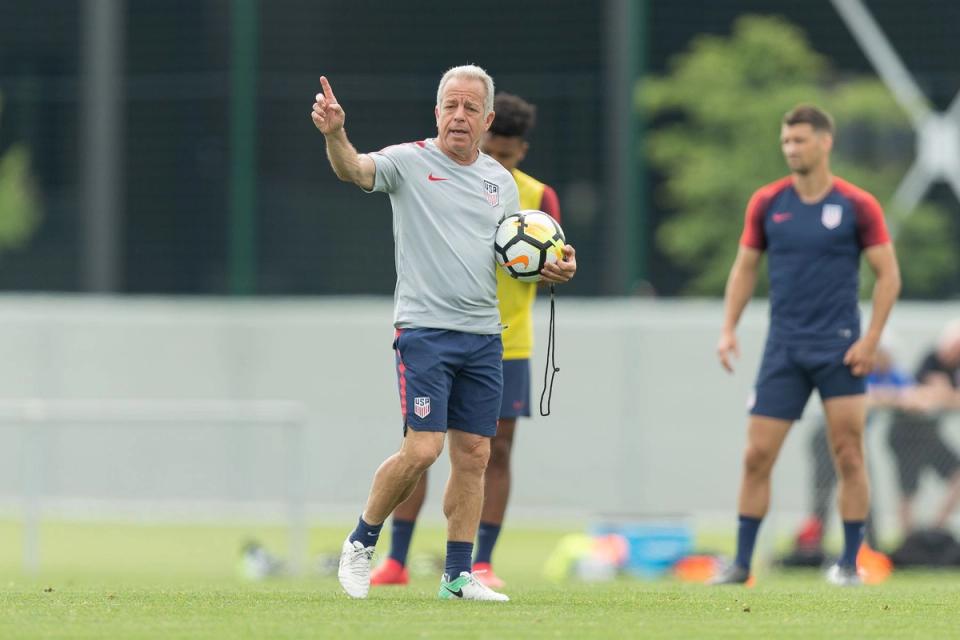
"We kept going as long as we could at the small little place where lunch was terrible, but the banter and the card playing was of the highest standard."
During his D.C. coaching tenure, Olsen wound up having lunch with Payne on a regular basis.
"We talked about the team, about the league," Olsen said. "It was a little daunting to have lunch three, four times a week with your boss every day and talk about your team. But looking back I cherish it because there was just so much knowledge, so much passion and the knowledge that I gained, the inspiration that was pouring out of him on a daily basis of pushing our club was a treat."
"If it wasn't soccer, he was talking about his family and bragging about his daughters or he was talking about hockey, and the Rangers and the New York sports scene growing up or his music. Those were the kind of the things that would constantly pop up when he was not solving the soccer problems of the world.
"It was neat because it was always nice to see a different side of him. He liked art. Kevin was a smart guy, and he was insatiable. He read a lot. He also was a history buff. He was very, very well rounded and his knowledge of not only current events and politics, but also I think he had a really good understanding about history."
In 2011 Payne was named the Werner Fricker Award winner, the highest honor the U.S. Soccer Federation can bestow on an individual.
Ten years later he was elected to the National Soccer Hall of Fame in the Builder category. He found out via a surprise party in Charleston, S.C. as Gulati and Arena journeyed down to tell their friend of his honor.
Gulati said it was "one of the highlights of my involvement in the game."
"A lot of his family was around and it was a very special moment, "he added. "Sort of pure joy for him. It was a special moment. I don't think I've seen a lot of the surprise announcements but I'm not sure anyone was more touched out of all the ones I've seen than Kevin and meant a lot to him. He certainly earned and deserved that recognition."

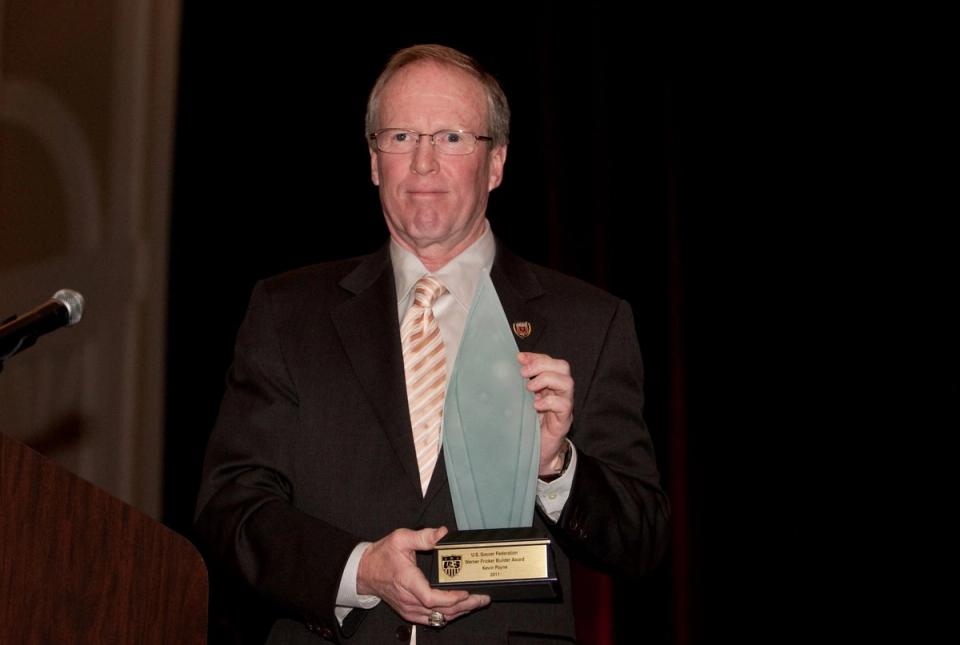
Arena said he wouldn't have missed it for the world. "That was one of the biggest thrills in Kevin's life," he said. "He was so touched by that whole thing."
Payne was inducted on Oct. 2, 2021.
"It was a huge moment. Very well deserved," Harkes said. "It was great to see him with loved ones and family and everybody. I’m proud of Kevin for what he had done in the game. It was very fitting to have that done certainly before he passed away."
While many of Payne's friends and colleagues were proud of his induction, the former United president was over the moon about Etcheverry's induction in 2022. At the time, Payne could not fly from Charleston, S.C. to Frisco, Texas because he needed to take an oxygen tank on the plane. So, his wife Pam and him drove all the way and back.
"Marco was a big deal for him as well," Olsen said.
Bruce Arena
“He's an unsung hero. The names you'll constantly see with MLS and U.S. Soccer or other people but Kevin was right there all the time behind the scenes, pushing for things that that helped grow the sport. I’ll remember how he worked behind the scenes and a guy that was tremendously passionate about the sport. We have a World Cup coming back to the United States again, and Kevin can take some of the credit for that.”
Sunil Gulati
“The game is stronger and better for every part of it that Kevin touched. It's not one piece. It's MLS and where it is. It's where US Club Soccer is and where the Federation is. It's where the business of the sport is, and the commercial successes. It's all of those things. So if you're looking for people that made a mark on the sport, Kevin Payne is certainly at the top of that list.”
Thomas Rongen
“From the time I arrived in this country in 1979 forward, there is a very small group of people that are close to Lamar Hunt and that includes Kevin Payne as a builder of the game. He was one of the most influential people. When it's all said and done, people will continue to look back at Kevin Payne. We all wanted to be D.C. United. We built our franchise based on the blueprint of the early use of D.C. United's template. He had a great nose to smell certain things and act upon them. He combined his great intelligence, incredible memory bank and great vision going forward.”
Jeff Agoos
“His impact is so broad from the time he was at U.S. Soccer, impacting young players, to the professional game to the national team. Kevin impacted every part of this game. That's why we are where we are at and why the federation is where they are. That's why the sport is where it is. He is a big pillar of the game in this country.”
John Harkes
“He was a fierce competitor. He always loved winning but wanted to always have that balance of doing things the right way with family too, which I thought was great. He loved his family, and he loves the soccer family.”
Dave Sarachan
“When you begin going through the list of names of people that had an influence in our game, from the technical side, from all growth side, you just can't leave Kevin out. There's an argument about Sunil or Don Garber or Bruce Arena. Kevin was there from the beginning of Major League Soccer. He created the model franchise, arguably the best in the history of the league. When you do that, everybody else is going to try to emulate and copy them and strive for them. He will be remembered as a guy who set the bar for everyone else to try to attain and that creates good things, challenging each other to be the best. You can't deny that Kevin was one of the architects of that.”
Richard Groff
“Kevin's legacy is the fact that he was in all areas of the growth of our sport. He wasn't just an administrator. He wasn't just a supporter of national team coaches. He grew the youth sport. He grew everything that he could in this sport. That's his legacy. When you would sit down with Kevin, you could talk about where the pros should go. He would talk about where U.S. Soccer should go and what they should invest in. He should talk about the proper way to market our sport and television. And at the same time, he would say youth soccer in this country is crazy. Too many people fighting with each other and not enough people working together to grow the sport. So his legacy is that he had an impact everywhere. Kevin's impact was in all parts of U.S. soccer. There are very few people who can say that.”
Bobby Convey
“He'll be remembered as one of the pioneers of MLS, one of the people that created a winning mentality. He'll be remembered for the end of his career for the work that he did with all youth players. He just loved soccer. He loved D.C. United. He just wanted the sport to progress, and he saw that it could progress. That is all he thought about.”
Peter Wilt
“Some of the legacy is going to be well defined publicly, and some of it is the quiet stuff. He was a fan and helped nurture the sport as an authentic sport in this country. I don't know that that's going to be something people talk about in the decades ahead. I think it will be his legacy, but it won't be recognized. That's the type of legacy that I'll have people think of me as a fan's first executive. But that's what Kevin was. He made soccer an authentic sport in this country. I think his recognized public legacy is going to be as D.C. United and the success, the trophies in those early years, the first dynasty and then to a certain extent, the executive tree and coaching tree through his coach hires that will be more recognized by people. His U.S. Soccer impact cannot be overstated.”
Joe Machnik
“Everybody knows this is a giant of American soccer. When MLS contracted and the Anschutz Entertainment Group had to pick up three or four clubs, they hired clever Kevin to manage that situation. In many ways you could say that MLS doesn't survive if people like Phil Anschutz didn't have confidence in Kevin to manage the situation when there were three owners operating the balance of the teams. Kevin knew how to manage a team. He had great management. He was a competitor.”
Dave Johnson
“Talk about a life well lived in soccer. He did it all. People would be able to look back and say he made a difference. Well, pick the year he made a difference. His legacy for soccer is that the game matters now. The World Cup was not a one off event. I don't think anybody logically could have challenged that we're going to have a successful World Cup. But making a league last and do something? Now we do have a league that is going to last forever. It's not a question of when is soccer going to make it in this country. It's made it.”
Ben Olsen
“He just advanced the game in this country as much as anybody. He made us better players, better people, better leaders. He influenced so many of us throughout his too short of a life. I'm just so grateful and thankful I was lucky enough to be one of those guys [who spent] a great deal of time with him.”
Eddie Pope
“I would say just being a pioneer, one of the major pioneers of Major League Soccer. Kevin was responsible for an early MLS club being known outside of the United States. I think that was a really big deal. It was to this point where everyone looked at this United team and that was the standard early on. It was hard to keep up with, but he did set that standard. And now see what that is today. There are a lot of people responsible for it, but he was certainly one of the pioneers.”
Greg Hutton
“Legitimizing the marketing and sponsor effort with U.S. Soccer when it was Soccer USA Partners and getting that up and running; massive impact there. Then transition obviously to MLS and probably a big reason why the league survived during those critical years, and the initial success of the league and D.C. United. He really created a brand and identity, which he tried to carry through with everything that he did after that as well. Within youth soccer, it transitions to the start of trying to change a culture, which is not something that was going to be recognized or completely solved from his tenure. We recognize that. It's an ongoing process and a big project. He's laid the foundation."
Mike Cullina
"One of the biggest things Kevin did is professionalize the sport in terms of its management and how its treated and creating the appropriate environments for players and staff. That transition from a solely volunteer based - volunteers are the lifeline of our sport so I am in no way diminishing, that; we don't have a sport without volunteers - but to professionalize it in a way that is providing the appropriate environments and checks in governance. Kevin had a huge part of that, whether it was with the league or the federation, or us.”
Hank Steinbrecher
“The continuation of the MLS because it was it was folding. He stepped into the breach. The legacy of successfully marketing the federation, whether it be employed by the federation or SUSAP, because we were just damn dead broke at the very beginning of 90s. He leaves lots and lots and lots of people he touched, people that have learned from him. It's incredible is what Kevin's reach was.”
Mark Washo
“He wanted to make a lasting impact and he wanted to make a difference. He really believed in soccer. And I think that's what he accomplished. No doubt Major League Soccer would not be where it is today without Kevin. I don't think the U.S. National Team would be where it is today. I don't think soccer in America would be as successful as it is. He accomplished what he set out to do and that's just really put soccer on the map and really ingrain it in the American sports landscape.”
Michael Lewis, the editor of FrontRowSoccer.com, can be followed on Twitter at @SoccerWriter. Lewis can be reached via email at socwriter@optonline.com. His book Alive and Kicking: The incredible, but true story of the Rochester Lancers, recently was published. It can be purchased here.